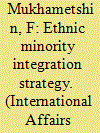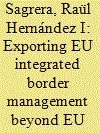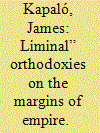| Srl | Item |
| 1 |
ID:
140592


|
|
|
|
|
| Summary/Abstract |
MATTERS RELATED TO LANGUAGE use go beyond the framework of philological disciplines and in some way or other impact various aspects of public life. Language and culture are recognized within the international community as principal "soft power" tools for promoting a country's positive image abroad. In addition to various aspects of language policy in Russia, the joint meeting of the Council on Interethnic Relations and the Council on the Russian Language, chaired by Russian President V.V. Putin, on May 19, 2015, stressed repeatedly the special role of the Russian language in expanding Russia's spiritual and intellectual influence abroad and in the preservation and development of the Russian World. In this context, it is equally important to counter the attempts of certain politicians who build their careers in their home countries on Russophobia, casting the Russian World as a "foreign policy project" of today's Russia, not as an objectively developed form of civilization that should be preserved.
|
|
|
|
|
|
|
|
|
|
|
|
|
|
|
|
| 2 |
ID:
129584


|
|
|
|
|
| Publication |
2014.
|
| Summary/Abstract |
The external dimension of European Union (EU) border management cooperation has recently been developed, in particular through the promotion of integrated border management (IBM). The European Commission has been keen to foster IBM, an attempt to reach EU standards in the absence of an EU common border service. Integrated border management is regulated under the Treaty of Lisbon, and the Stockholm Programme calls for its further development. This article analyses and compares the policy instruments promoting IBM standards beyond EU borders, namely the European Agency for Operational Cooperation at the External Border of the Member States of the EU (FRONTEX) (with the signature of Working Arrangements with the border services of third countries) and the activity of the EU Border Assistance Mission to the Republic of Moldova and to Ukraine (EUBAM) at the Ukrainian-Moldovan border. Moreover, it provides an empirical account of IBM activity carried out in the Eastern Partnership and Russia, and explains the reasons underlying the lack of IBM promotion in the southern Mediterranean countries.
|
|
|
|
|
|
|
|
|
|
|
|
|
|
|
|
| 3 |
ID:
152477


|
|
|
|
|
| Summary/Abstract |
In the 20th century, the Russian Orthodox Church, the Romanian Orthodox Church, and the Soviet atheist state each pursued missions that attempted to transform Moldovans into loyal and trustworthy subjects and to integrate them into new state structures. This article explores the “liminal” character of Moldovan identities forged on the Russian and Romanian borderlands through the prism of Moldova's “home-grown” religious movements. Grass-roots movements led by charismatic and “trickster” religious figures “played” with dichotomies of the hidden and the revealed, innovation and tradition, and human and divine, succeeding in transforming the subject positions of whole segments of Moldovan peasant society. The resulting forms of “liminal” Orthodoxy have proved enduring, perpetually critiquing and transgressing canonical norms from the margins and subverting the discourses and narratives that seek to “harmonize” identities and to consolidate nation, state, and church in the Republic of Moldova.
|
|
|
|
|
|
|
|
|
|
|
|
|
|
|
|
| 4 |
ID:
127496


|
|
|
|
|
| Publication |
2013.
|
| Summary/Abstract |
APRIL OF THIS YEAR marked 21 years since the establishment of diplomatic relations between the Russian Federation and the Republic of Moldova. The underpinning document for present-day Russian-Moldovan relations is the Treaty of Friendship and Cooperation signed on November 19, 2001, which laid the groundwork to upgrade them to a strategic partnership level that meets the vital interests of the peoples of our countries, linked by centuries-old ties of friendship.
|
|
|
|
|
|
|
|
|
|
|
|
|
|
|
|